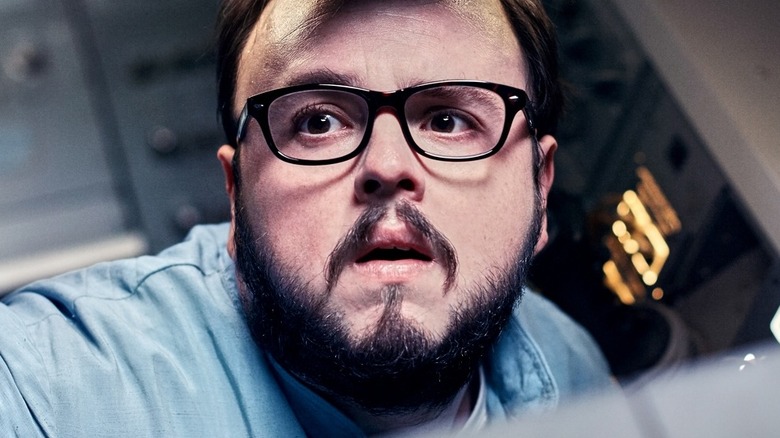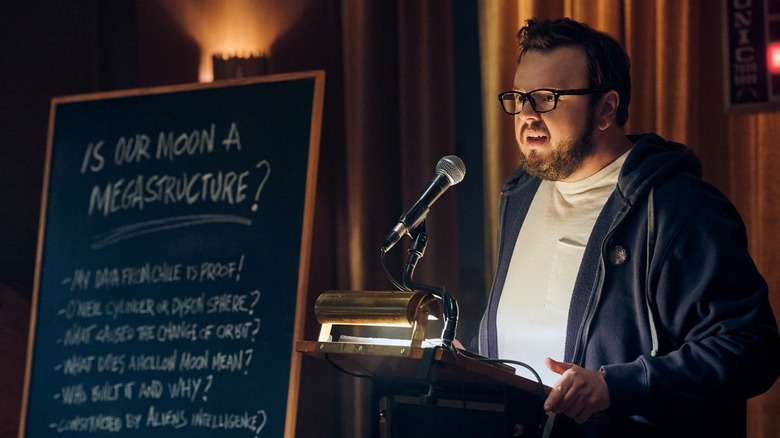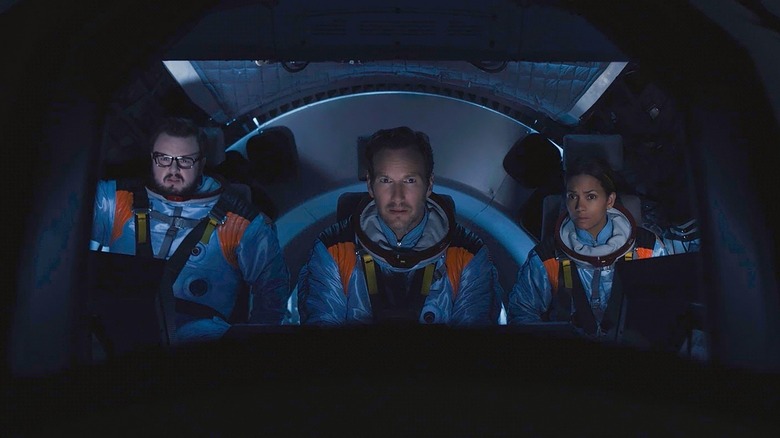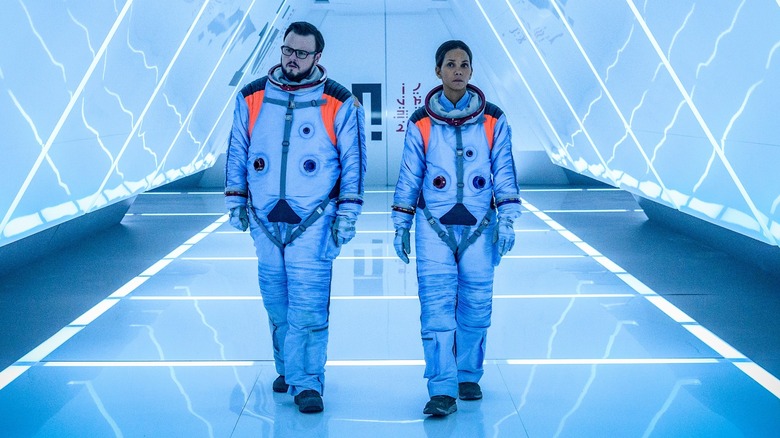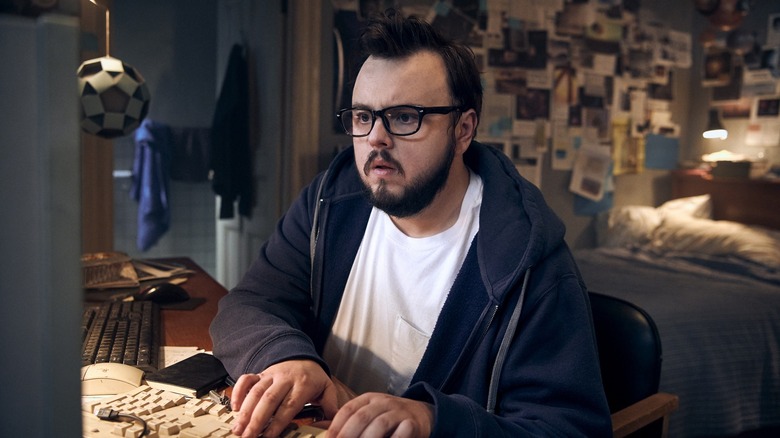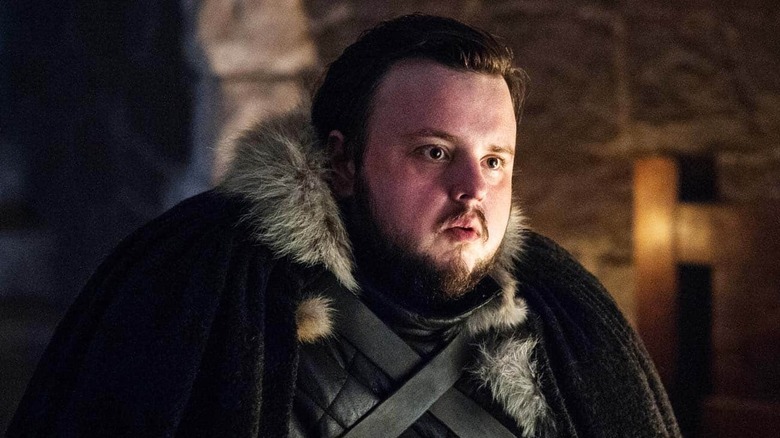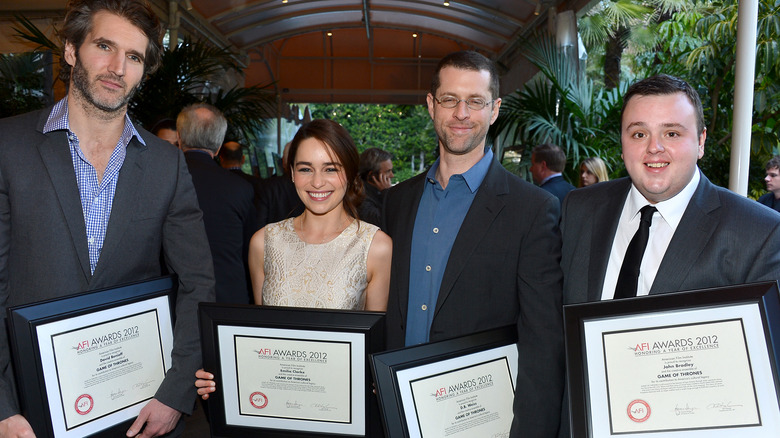Moonfall Star John Bradley On Unlikely Heroes, Game Of Thrones Memories And More - Exclusive Interview
British actor John Bradley finds himself leaving behind castles and dragons and heading into the far reaches of space in director Roland Emmerich's new apocalyptic sci-fi film, "Moonfall." Bradley, beloved by audiences around the world as Samwell Tarly on all eight seasons of "Game of Thrones," stars here alongside Halle Berry and Patrick Wilson in a thriller about the discovery that a mysterious force has shifted the Moon off its orbit and pointed it toward Earth in a clear extinction-level event.
Bradley plays K.C. Houseman, a would-be geoscientist and so-called "megastructuralist," who has been following the strange developments on the Moon for a decade and is the first to figure out what's happening. He's dismissed initially as a crackpot conspiracy theorist because of his outlandish hypothesis that the Moon is not a natural object, but an artificial one. Only when he teams with Wilson's Brian Harper — a disgraced astronaut who witnessed the incident that triggered the Moon's shift — does Houseman begin an adventure that will take him into space to fight for humankind's survival.
Graduating in 2010 with a degree in acting from Manchester Metropolitan University, Bradley went on his very first audition and landed the role of Samwell, the loyal and keenly intelligent — if cowardly — sidekick to Jon Snow. Following the completion of "Moonfall," Bradley recently reunited with "Thrones" showrunners David Benioff and D.B. Weiss for their Netflix adaptation of "The Three-Body Problem," Liu Cixin's award-winning sci-fi novel. "If (Benioff and Weiss) manage to pull off 'The Three-Body Problem,' it's going to be one of the most extraordinary achievements we've ever seen on TV, I think," Bradley tells Looper in our exclusive interview below.
Creating his 'indomitable' character
Your character, K.C. Houseman, can be described as an "unlikely hero" in a lot of ways. Is that how you saw him?
That's exactly how I'd describe him: an unlikely hero who's waiting for his chance and waiting to be respected and waiting for the world to stop overlooking him before he's given his chance to contribute, before he is given his chance to be brave.
When the movie starts, K.C. carries so much frustration around with him because he knows something to be true and something that's vital for the continuation of the human race. Yet, because he doesn't have the right qualifications after his name or because he doesn't look right and because he doesn't have the right contacts, he's completely ignored. It's only his indomitable spirit, the fact that he refuses to roll over, the fact that he refuses to stop banging on doors to try and get himself heard, that allows him to fulfill his potential. Nobody else is going to give him that chance, so he refuses to give up. I think that says something about the human spirit that hopefully people can learn some lessons from.
Did you have the creative space to add things to the character? Is Roland, as a director, open to that kind of thing?
He is very much open to that kind of thing. It's a great balance that he strikes between his own expertise, and with Roland, it really is expertise. You very rarely get to work with somebody in your career who's a complete expert in their field. If you're going to do a disaster movie, have Roland direct it because nobody else knows what they're doing and nobody else has got the experience to that same degree. So nobody's going to tell him or advise him on how to destroy the Earth.
When it comes to the characters, he does make it feel like a collaboration. He wants you to invest as much humanity in them as possible, if that's drawing things from your own life or putting a perspective on the character that's slightly different to what's written.
If it enriches the character, he knows that it enriches the entire movie because you have to care about these people as human beings before you care that the world's going to explode. If you don't care about them, the jeopardy of what's going to happen to the world just won't register. He's determined to make them real people, and if that involves you going slightly off script and bringing other elements to it that deepens their psyche and their motivations and their narrative progression through the story, then he's very open to those suggestions.
An angry young man
Was there anything that you brought to the character that wasn't in the script?
I don't think he was quite as angry, initially, as I made him out to be. It was a bold choice to make, really, but there could have been a world at the start where K.C. Houseman is downtrodden and he's not believing in himself and he has a lack of self-esteem because of the amount of doors that have been slammed in his face. For me, I thought it'd be much more interesting if he has total confidence in himself and he's not [intimidated] and he's never on the back foot. He's always willing to go in and point the finger at people and say, "You are going to listen to me, and if you're not going to listen to me, I'm going to keep shouting until I shout loud enough that you can't ignore me anymore."
I thought that was an interesting place to start him off. He's not a weak person, he's an incredibly strong person, and that makes the moment of redemption for him, when he finally gets to contribute to saving the world, much sweeter because you know what it means to him and you know that he deserves it in a way. He deserves that chance.
Without giving away too much, K.C. ends up in an interesting place by the end of this film. Has Roland spoken about the possibility of continuing this story or broached any ideas about where it could go?
He's not broached it to me personally, but I've been reading some things that he's said about where he's going to take it next. It is difficult because you do yourself a disservice by making a movie that's as spectacular and on the scale of "Moonfall," because a sequel has to build on that and has to somehow do more than that and somehow get bigger and more epic.
There may be a world in which whatever's inside the Moon that wants to cause us harm — maybe that's not the end of it. Maybe this is a problem that stretches out to the very limits of the universe. Just as we think we've cracked the code by dealing with the Moon as a threat, we may find that there are an infinite amount of threats out there that are willing to take over. When you've got an imagination like Roland's, there's unlimited scope for that kind of thing. If it does happen, I'll be as excited as anybody else to find out what he comes up with.
Moonfall was a grueling shoot
Like all disaster movies, this is a very physical production. What was the most fun stuff to do, and what was maybe the most difficult to do?
The zero gravity stuff was quite difficult. It wasn't necessarily physically difficult. It was more mentally difficult because it goes against all the accepted implicit laws of motion that you learn from a very young age. We spoke to some astronauts about this, and they said the key to moving through zero gravity is totally forget that it's your legs that are your main engine. It's your arms in zero G; your legs don't do anything. Your legs are dead weight and you steer yourself around with your arms. As soon as we got that into our heads, it all made sense, but it was just such a different physical discipline to click into.
Then, the scene where the hotel lobby gets flooded, that was something that had big stunts involved, and before I started that scene, I thought, "They're bound to do some kind of CGI technical wizardry. I wonder how they're going to make it look like the hotel lobby's flooded." Turns out, they flooded it and it was just gallons and gallons of filthy water on a set for, I think, a couple of days back to back. That was a different thing as well, because in a movie where you've got to imagine so much and there's so much green screen, to do a practical effect rather than a technical visual effect was a real thrill. Looking back on it, it was fun and it looks cool in the movie, but I won't want to do it too often because I swallowed a gargantuan amount of filthy water that day and I don't want to repeat that anytime soon.
How does that compare to something like "Game of Thrones," where you were wet and cold and rolling around in mud and crap for a few years?
Well, the main difference between that kind of environment in "Moonfall" and "Game of Thrones" is that in "Game of Thrones," I had the clothes to deal with it. We were in the cold for a long time, but we all had ... I had a thick leather tunic, I had an animal pelt, I had a cloak on that was actually an Ikea rug that weighed about 50 pounds [and was] strapped on my back for 10 years. You didn't necessarily feel the cold. It was uncomfortable, but you didn't feel the cold. In "Moonfall," I had to be swishing around in freezing cold water all day in just a little T-shirt and a hoodie and a pair of jeans. They were both unpleasant, but I would say that [in terms of clothing], I was slightly more suited to it in "Game of Thrones" than "Moonfall," for sure.
Making a movie during a pandemic
This was shot during COVID. What was it like to actually shoot under those conditions?
There were a lot of negative points to it, but there were some positives as well. The negatives being that normally, when you are away working, you get to socialize with your cast and your crew. You get to go for dinner and you get to go for drinks, and that's where your chemistry and your camaraderie comes from. You get to know each other as people and then, when you step in front of the camera, there's a trust that's already there because you're already friends before you start shooting.
That was absent from this, so we had to get all of our chemistry together in front of the camera. The only time we ever saw each other without masks on was when we were acting together. Those moments became very precious and we bonded over having to shoot this very ambitious movie in quite difficult circumstances. Everybody was very committed to it because of that. It really bonded the cast and crew together.
There [were] some negative elements to it, but the positive was, as soon as we got to Montreal, we had to quarantine for 14 days on our own, and it's such a luxury in a way that you get 14 days completely on your own, away from the pressures of real life, away from being a dad and away from being a mom or a husband or wife or partner. You get to completely, selfishly immerse yourself in a part in a movie for two weeks before you even start to shoot it. In a weird, warped kind of way, we really used that time to enhance our understanding of the work.
That was a tiny little silver lining to that cloud because it was quite a difficult experience. Hopefully, we managed to get a very ambitious movie done in 61 days, which is barely anything for a movie like this. Hopefully, people will appreciate the hard work we put into it.
What Game of Thrones has meant to John Bradley
"Game of Thrones" was literally the first job you booked after graduating from school, which is such an astonishing thing. Now, with a little bit of distance, what's your perspective on the show and what that ride was like for you?
It was a dream job in so many ways for a young actor fresh out of drama school. It was not even about the material, which was wonderful, and not about the amazing people that I got to work with along the way. It was a big American show that eventually turned into the biggest show in the world, but it was only filmed in Northern Ireland. It's not like we had to move ourselves across the Atlantic Ocean for a decade. We could live close to home, we could still keep our family and friends close to us and take a 40-minute flight and shoot the biggest show in the world for 10 years and make so many great friends along the way.
I think what it's left us and what it's left the world is that it broke a mold when it came to a TV show that gets the whole world talking. There were great TV shows before that and some of my favorite shows along the lines of "The Sopranos" and "The Wire" and things like that. They're wonderful shows, but they were slow burners and people are still discovering those shows. The thing about "Game of Thrones" is if there was a new episode on a Sunday, the world was talking about it on the [following] Monday.
I think there are so many shows like that now, the huge global [phenomena] like "Squid Game" and the Marvel things that are on Disney+ and the Star Wars things and all that kind of stuff. There's so many of them now, but I think that we set a new benchmark for that appointment TV that the whole world was fixated on. David (Benioff) and Dan (Weiss) and everybody at HBO who was involved with the show created that template. So many other shows are taking our lead and following that now, I think.
The Three-Body Problem
You're working with David and Dan now again on "The Three-Body Problem," which could be as big in science fiction as "A Song of Ice and Fire" was in fantasy. What can you tell us about the show?
I tried to read the novels before Christmas and I did read them. They're very, very dense and they've got a lot of scientific theory to them, which feels impenetrable. It almost feels like they've been written for an audience that already knows quite a lot about physics before they start reading them. I thoroughly enjoyed them. They're very, very dense and very heavy and very academic works, almost. The thing that David and Dan have done is that they've managed to make them accessible and entertaining and they've managed to give them that lightness of touch that "Game of Thrones" had in its very best moments.
There are parts of "The Three-Body Problem" in terms of the ambition of it that make "Game of Thrones," I think, look like very safe ground. There's so many aspects to it. It's so ambitious and David and Dan, I love them so much, and I'm grateful for what they've done for my career and are continuing to do now. I hope it's a huge success for them and I hope that people get back on board with them as being the great writers that they are. I hope this puts a lot of bad feelings to rest for them, because I think that if they manage to pull off "Three-Body Problem," it's going to be one of the most extraordinary achievements we've ever seen on TV, I think.
"Moonfall" is now playing exclusively in theaters.
